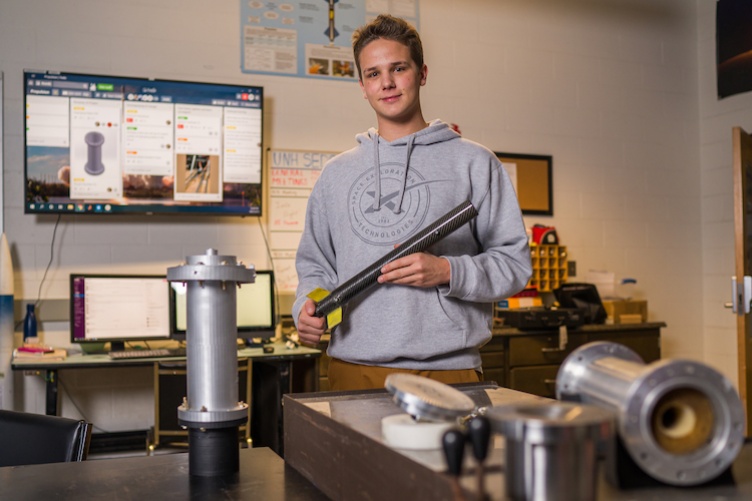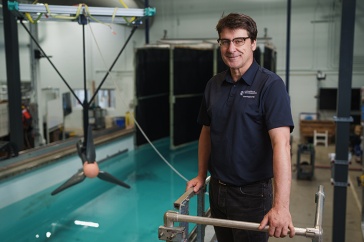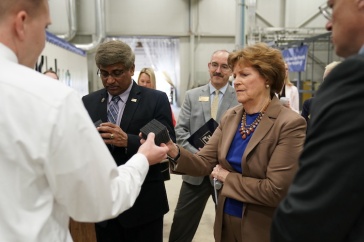
Charlie Nitschelm ’20 started applying for jobs related to space exploration when he was a freshman. Every time, he was auto-denied, his application rejected without being read, sometimes within an hour of sending. Then he had one of those chance life moments with just about the biggest player in the game.
Nitschelm came to UNH not knowing what he wanted to do, so, because it was something he was good at, he decided to major in math. Enter another life-altering moment — a video of a sub-orbital rocket landing— and he switched to mechanical engineering.
“It was in January, the start of my second semester. I still remember that moment,” Nitschelm says of the day that set him on the course to study space science. “It was a YouTube video of SpaceX’s Falcon 9 rocket landing after flying to space. It still gives me goosebumps.”
After that, Nitschelm founded UNH’s Students for the Exploration and Development of Space (SEDS), landed a Matthew Isakowitz Fellowship, which connects students with internships at commercial spaceflight companies, and interned this past summer with Rocket Lab, a private aerospace manufacturer and launch service provider headquartered in California.
“If we didn’t have the audacity to look up — if we were in a village surrounded by mountains thousands of years ago and hadn’t looked over that peak, we’d still be stuck in that village.”
On July 25, Nitschelm took time off from his internship to attend the Matthew Isakowitz Fellowship summit. He remembers the date clearly because that’s the day he met Elon Musk.
The summit attendees were going to get a brief meeting with the SpaceX founder where he would answer their questions; the 25 fellows each submitted a question. Only four were selected; one of them was Nitschelm’s. Then, after Musk had left the room, one of his assistants sought Nitschelm out.
“She said ‘Mr. Musk wants to talk to you,'” the Portsmouth, New Hampshire native says. “I got to talk with him for about 10 minutes. He asked me why I hadn’t applied to SpaceX, and I told him I had, but that I’ve always been denied. After that, my information got passed on and I ended up getting an interview.”
And a job.
Nitschelm had five phone interviews with five different people over a two-week period. Then SpaceX flew him to Los Angeles. He gave an hour-long technical presentation on his work with rocketry and then interviewed one-on-one with team members for more than six hours. The next day they called and offered him the job. He starts July 8 as a build engineer working on Starship, SpaceX’s next launch vehicle destined to land the first humans on Mars.
“It was all pretty amazing. The hiring rate for engineers at SpaceX is below 1 percent, and most of those come from the top 10 aerospace schools,” Nitschelm says. “Life is about moments. If I hadn’t had that moment of seeing that rocket launch, I would never have gone into space exploration.”
He could have started at SpaceX sooner, but he had a prior commitment with his fellow SEDS members to attend the Spaceport America Cup rocket competition next June in New Mexico — if they got in. At the time he accepted the job, he didn’t know they had.

“More than 250 teams apply and only 150 get in, and around half of those are international,” Nitschelm says.
In June 2020, the UNH SEDS team will present the results of their three-year rocket-making project, “Journey to Spaceport.”
“We learn new things by going into territories we don’t know,” Nitschelm says. “Think about what’s going to happen in the next decades. Think about landing on Mars, and what that will mean to us as a species, to leave our home planet and live on another planet.”
In answer to the question that many people ask about the benefit of space exploration, Nitschelm says, “There is so much that needs to be invented because we need to invent it for exploration,” and cites the Hubble Space Telescope as example: when the first images from the telescope were viewed, they were blurry. The method used to fix the problem helped make mammograms more accurate.
“We are explorers by nature,” Nitschelm says. “If we didn’t have the audacity to look up — if we were in a village surrounded by mountains thousands of years ago and hadn’t looked over that peak, we’d still be stuck in that village.”
-
Written By:
Jody Record ’95 | Communications and Public Affairs | jody.record@unh.edu


















































